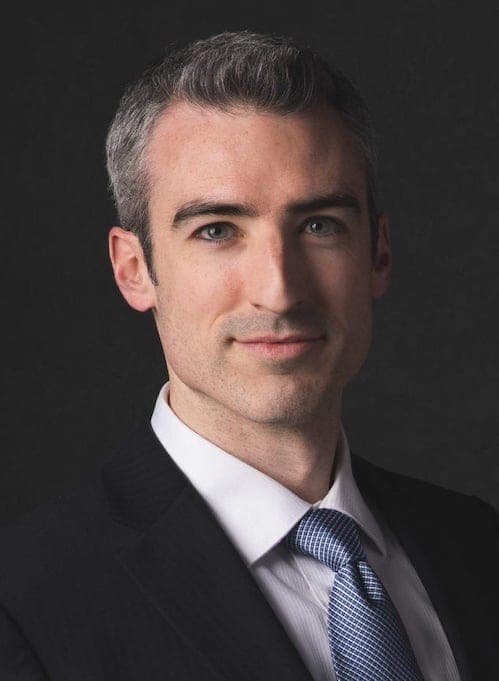
Master's degree in real estate led alumnus Josiah Byrnes to lifelong career connections
Josiah Byrnes (MRED '10), President of Embree Capital Markets Group, credits the W. P. Carey Master of Real Estate Development (MRED) for helping him to understand and integrate elements of real estate development to achieve success while looking at projects in a more holistic and four-dimensional way.

Josiah Byrnes (MRED ’10) President of Embree Capital Markets Group, credits the W. P. Carey Master of Real Estate Development (MRED) for helping him to understand and integrate elements of real estate development to achieve success while looking at projects in a more holistic and four-dimensional way.
The W. P. Carey School of Business interviewed Byrnes to learn more about his experience as a W. P. Carey graduate student, why he chose to pursue a career in real estate development, and what's next in the industry.
Why W. P. Carey?
Byrnes decided to pursue a W. P. Carey master's degree in real estate development because it was the right place and time. He had looked at several schools across the country, and appreciated the manageable length of ASU's program. "It was both affordable and approachable from a time commitment standpoint," he says. "I didn't know at the time how great it would be for networking and professional development, too."
W. P. Carey set the stage for Byrnes to understand himself, where he thrives, and the importance of setting achievable and fulfilling career goals. "Over the course of three different projects, our team was given a certain amount of ambiguity. We would collaborate as a group to figure it out," he says.
"We put forth an action plan, mapped out a schedule, and defined success thresholds. The skills I learned directly translate into my work today."
Mark Stapp, Executive Director of the MRED program, emphasized the importance of ethically and socially minded real estate principles. "Stapp was very holistic in his approach to real estate," says Byrnes. "He didn't want us to be there just for the money."
Byrnes and his classmates learned how real estate has an impact on people's overall health and well being. "Ultimately, you're developing spaces or building spaces for people. You're creating their built environment," he says.
"We were challenged to look at development problems more pragmatically, and somewhat four dimensionally — attacking problems not just from a financial component, but various other components."
The program focused on a holistic approach to real estate development. "You have to think, is it physically possible to do what you're trying to do? Is it legally permissible? Is it financially feasible? And then thinking about the potential outcomes — and how they are maximally productive or potentially profitable," says Byrnes.
Why real estate development?
The MRED program offered experiences that helped Byrnes realize he was on the right path. "There were two trips — one in fall and one in spring, that gave me the opportunity to have meaningful conversations with folks who were industry practitioners and experts in their field," he says.
"Seeing how real estate is approached across different places in the United States, specifically Denver and San Francisco, and getting out of the Arizona bubble was helpful.
Real estate creates the environment where we all live, work, and play. "It's interesting to be able to positively contribute through design choices. And from a practical standpoint, we need more space, and people need roofs over their heads," says Byrnes. "We follow demographic trends and determine where people are going, and the needs they have."
Success in development is a lot of hard work. "You don't have to be smarter than anyone else or have more capital," he says. "To succeed, you have to be willing roll up your sleeves and work harder than anyone else."
What's next?
As an MRED alumni, Byrnes has kept in touch with his classmates and utilized networking opportunities. "I've even done business with classmates, and actually worked with many of them," he mentions. "I even had the chance to hire one of my classmates to join my company. The degree has more than paid for itself through sheer professional networking."
Byrnes is looking forward to growing the scale of his investment and development platform. "We'll need some additional talent to help us, and I'm excited about the future and growth prospects we have."
During his career, his firm has developed several community hospitals. "I had a classmate who was able to invest in these projects," says Byrnes. "It was great to see the real world application of MRED principles — especially with people who were in the program with me, and with profitable outcomes."
Byrnes believes there are two big themes for the future of real estate development. "Part of it's COVID-19 related, having to do with office spaces — the evolution of remote and hybrid work — and part of it's the general maturation of asset classes and corresponding re-development opportunities."
Propel your career with an MRED from ASU
Request information directly from our graduate recruiting team. We can't wait to meet you!
Latest news
- American customers are madder than everIn a world where buying takes a click, fixing a problem can feel like a marathon, according to consu
- Gifts that give back
This holiday season, give gifts that stand out — and support the Sun Devil community — from…
- Who is the new Brazilian owner of Hickman's Family Farms?
The sale of Arizona's largest egg producer could lead to 15% higher prices due to fewer choices…